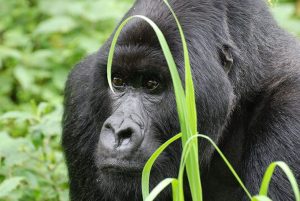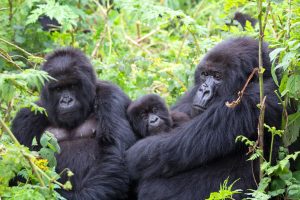Gorilla safaris are among the most unique wildlife experiences in the world, attracting travelers to Uganda, Rwanda, and the Democratic Republic of Congo (DRC). Safety is one of the most common questions asked by tourists planning to trek mountain gorillas in their natural habitats. These endangered primates live in protected forests, and strict regulations are in place to ensure that both tourists and gorillas remain safe. Are Gorilla Safaris Safe.
Are Gorilla Safaris Safe for Tourists?
Yes, gorilla safaris are safe for tourists. Countries offering gorilla trekking Uganda, Rwanda, and the DRC have established strict safety measures in their national parks. Visitors trek only in small groups led by trained guides and escorted by armed rangers. The gorillas visited are habituated, meaning they have undergone a careful process that makes them accustomed to human presence without posing a threat. Park authorities also implement daily monitoring of gorilla families, ensuring that the tours run in secure and controlled environments.
Are Gorilla Safaris Safe in Uganda?
Uganda is one of the safest destinations for gorilla safaris. The country protects gorillas in Bwindi Impenetrable National Park and Mgahinga Gorilla National Park. Each trek is guided by professional rangers, trackers, and security escorts. Tourists are required to follow park rules, including keeping a minimum distance of seven meters from gorillas. Bwindi, in particular, is known for its well-organized trekking system, and Uganda Wildlife Authority enforces strict safety and conservation policies. Incidents involving tourists and gorillas are extremely rare.
Are Gorilla Safaris Safe in Rwanda?
Rwanda is considered one of the most secure destinations for gorilla trekking. Volcanoes National Park is highly regulated, with tourism revenue directly supporting conservation and community projects. Every trek is limited to eight tourists per gorilla family, accompanied by experienced guides and armed escorts. Rwanda’s focus on high-end tourism ensures that safety standards are extremely high. Visitors consistently report positive and safe experiences in Volcanoes National Park, making Rwanda a preferred choice for those concerned with security and ease of access.
Are Gorilla Safaris Safe in the Democratic Republic of Congo?
The Democratic Republic of Congo offers gorilla safaris in Virunga National Park, home to both mountain gorillas and eastern lowland gorillas. While the DRC has experienced political instability, Virunga has invested heavily in security for tourists. Treks are always escorted by armed rangers, and access is closely monitored. Tourists who visit the DRC for gorilla trekking typically report safe experiences inside the park itself, though travelers are advised to book with reputable operators and stay updated on travel advisories. Uganda and Rwanda remain more popular due to their consistently stable environments.
How Safe Is Gorilla Trekking in Bwindi Impenetrable National Park?
Bwindi Impenetrable National Park in Uganda is a top destination for gorilla trekking, and safety is strictly enforced. Each trek begins with a safety briefing where tourists are instructed on how to behave in the forest and around gorillas. Trekkers are always accompanied by guides and rangers familiar with the terrain and gorilla behavior. Gorilla families in Bwindi are habituated, which makes encounters calm and predictable. The park also ensures medical safety by requiring trekkers to avoid gorilla contact if they show symptoms of infectious illness.
How Safe Is Gorilla Trekking in Volcanoes National Park?
Volcanoes National Park in Rwanda is highly regarded for its safety and organization. Security presence is strong, and the park enforces a system where treks are only done under guided supervision. The gorillas visited are habituated, and visitors are provided with clear guidelines on how to behave. Rwanda’s conservation policies have created a safe environment for both gorillas and tourists. The trekking trails are well-maintained compared to some other regions, making the experience more accessible and safe even for less experienced hikers.
Do Gorillas Attack Tourists on Safaris?
Gorillas rarely attack tourists during safaris. The gorillas visited are habituated, meaning they have been gradually accustomed to human presence over several years. They are calm and tolerant of visitors as long as tourists follow the rules. Aggressive behavior from gorillas is extremely uncommon, and guides are trained to manage any unusual situations. In the rare event of a bluff charge by a gorilla, guides instruct tourists to remain calm, avoid direct eye contact, and follow their lead. With these measures in place, risks are minimized.
Are Mountain Gorillas Dangerous to Humans?
Mountain gorillas are powerful animals, but they are not inherently dangerous to humans when approached under regulated safari conditions. The gorillas that tourists visit are habituated and monitored daily by park rangers. Problems generally arise only when humans break rules, such as getting too close, making sudden movements, or attempting to touch the gorillas. By respecting park regulations and maintaining the recommended distance, tourists can observe gorillas safely without fear of aggression.
How Close Can You Get to Gorillas on Safari?
Tourists are required to keep a minimum distance of seven meters (about 23 feet) from gorillas during safaris. This rule protects both humans and gorillas: it prevents disease transmission and reduces the likelihood of stress or aggression in the animals. Guides and rangers ensure that this distance is respected at all times. In some cases, gorillas may approach tourists, but visitors are instructed to remain calm and still. The seven-meter rule is one of the most important safety measures in gorilla tourism.
What Safety Rules Are in Place During Gorilla Safaris?
Several safety rules govern gorilla safaris to protect both tourists and the animals:
-
Trekkers must keep a safe distance of seven meters from gorillas.
-
Groups are limited to a maximum of eight tourists per gorilla family per day.
-
Tourists must not eat, drink, or smoke near gorillas.
-
Flash photography is prohibited.
-
Visitors showing symptoms of illness are not allowed to trek.
-
Tourists must follow the instructions of guides and rangers at all times.
These rules have been designed to make gorilla safaris both safe and sustainable.
Do Armed Rangers Escort Gorilla Safaris?
Yes, every gorilla safari trek is escorted by armed rangers. Their role is to ensure tourist safety in the forest and to protect against any potential threats, including wild animals such as elephants or buffalo. The presence of armed rangers also provides reassurance for tourists trekking in remote areas. These rangers are highly trained and work in coordination with park authorities, making guided treks extremely secure.
Is It Safe to Do Gorilla Trekking Alone?
No, tourists are not allowed to trek gorillas alone. Gorilla trekking is only conducted in organized groups led by official guides and rangers. This rule enhances safety, ensures controlled interactions with gorillas, and prevents unauthorized access to the forests. Even if a traveler books solo, they will always be grouped with other trekkers and escorted by professional staff. This system guarantees that no one enters gorilla habitats unaccompanied.
What Happens If a Gorilla Charges During Safari?
In rare cases, a gorilla may display a bluff charge, usually to assert dominance or protect its family. Guides instruct tourists to remain calm, crouch slightly, and avoid direct eye contact. Running or making sudden movements is discouraged. Bluff charges almost never escalate to attacks, and habituated gorillas generally retreat once they feel their dominance has been acknowledged. Guides are experienced in handling such behavior, and tourists who follow their instructions remain safe.
How Physically Safe Is Gorilla Trekking in Terms of Terrain?
Gorilla trekking involves hiking through forests, sometimes on steep or muddy trails. While safe, it can be physically demanding. Tourists should be prepared for challenging terrain, especially in Bwindi Impenetrable National Park, where trails can be steep and slippery. Porters are available to assist with carrying bags or offering support during hikes. Travelers with reasonable fitness levels generally manage well, and safety protocols ensure that treks are conducted at a manageable pace for all participants.
What Health Precautions Are Needed for Gorilla Safaris?
Health safety is an essential part of gorilla safaris. Tourists must not trek if they are sick, as gorillas are vulnerable to human diseases. Vaccinations for yellow fever, hepatitis, and typhoid are recommended, along with malaria prevention. Trekkers are advised to carry hand sanitizers and wear masks if instructed. Park authorities enforce health regulations strictly to safeguard gorillas and visitors alike. By following these guidelines, tourists can enjoy a safe and healthy safari experience.
Are Children Safe to Go on Gorilla Safaris?
Children under the age of 15 are not permitted to participate in gorilla trekking. This rule ensures safety, as trekking requires maturity to follow instructions and maintain discipline around gorillas. While families with younger children cannot join gorilla safaris, alternative activities such as cultural tours and nature walks are available. For those above the age limit, gorilla trekking is safe as long as they meet the physical and health requirements.
Is It Safe to Combine Gorilla Safaris with Other East African Tours?
Yes, combining gorilla safaris with other tours in East Africa is safe and common. Many tourists add game drives in Kenya or Tanzania, chimpanzee trekking in Uganda, or golden monkey tracking in Rwanda to their itineraries. Tour operators arrange seamless cross-border travel with safety as a priority. With proper planning, tourists can experience multiple wildlife adventures in a secure and organized manner.
Gorilla Safaris Are Safe and Well-Regulated
Gorilla safaris in Uganda, Rwanda, and the DRC are safe, secure, and professionally managed. With strict rules, guided treks, habituated gorilla families, and strong conservation policies, tourists can experience close encounters with mountain gorillas without compromising their safety. By following the guidance of rangers, respecting regulations, and taking basic health precautions, travelers enjoy one of the most remarkable wildlife experiences in the world.




